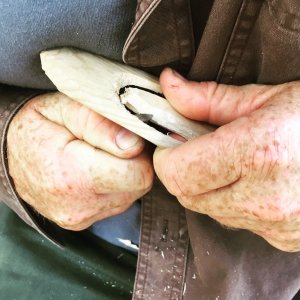
If you eat a great meal at a restaurant, is the type of spatula the cook used responsible for the taste of the food? If you see a beautiful house, how important is the type of hammer the builder used to the final structure? If someone has a beautiful website, do you ask them what [...]
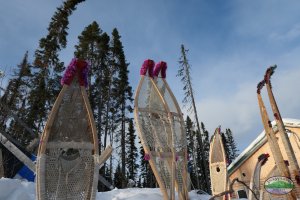
One of the more philosophical individuals who’s taken our semester program over the years posed a very good question to me a few years ago, and since then I tend to pose it to others who engage in long-term bushcraft and survival practice. It was a year after he had taken the course, during which [...]
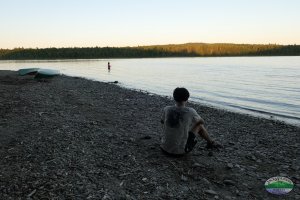
I’ve been thinking about these last few weeks as “the worldwide solo”. The current pandemic is forcing people to spend time with themselves, and if there’s a good side to this situation, that time for self-reflection and introspection is it. All of our courses have a solo aspect, and it happens in two parts. First, [...]
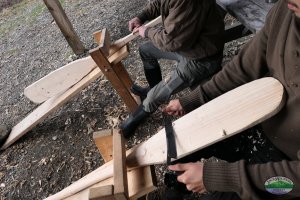
It’s week three of the semester, and students have started their first big project; making canoe paddles. This project is usually the first big test of patience for students during the semester. Up till now, they’ve built up a sense of working wood with small projects like netting needles, carving bowdrill sets, etc. Those are [...]
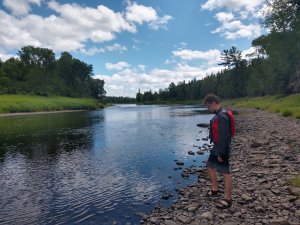
If you listen to our podcast, read our blog, or spent any time with us at the field school, you’ve heard us talk about learning outdoor skills in context. I’ve been bouncing this idea around in my head a lot over the past months while running short programs for museums, schools and science centers. As [...]
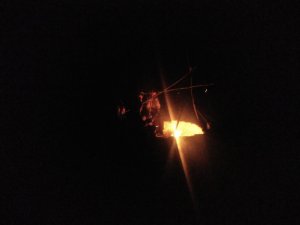
Recently I saw an advertisement for new rain gear from a large outdoor gear company. They chose to market this with the phrase “rain? what rain?” Seems straightforward enough, but it got me thinking about a certain trend in the outdoor industry. The idea is that the outdoors is a place where you go for [...]
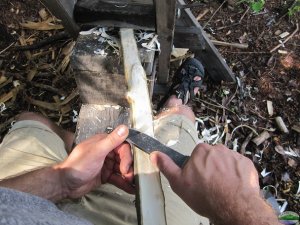
Process Not Product is a familiar phrase at our school. We want to give people the tools to replicate what they do at the field school after they leave. If it were just about ending with a finished product, we might do things differently. But for us it’s about giving people the tools to create [...]
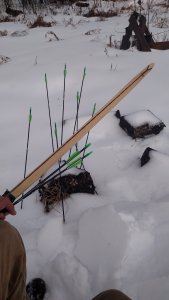
There’s always downtime on residential courses. Students and instructors need time to relax, work on academic homework, and process the experiences they’ve had so far. For some students, downtime is frustrating. They learn by doing and don’t want to stop. So along with improving our food systems on campus, we’ll be putting in two additions [...]
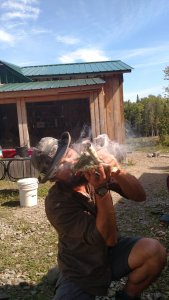
Our culture is so used to ranking things, that it’s become entrenched in the mindset of most people (myself included). We want to know the “Best” way of doing things, and often desire a form of documentation to show that we’ve “progressed”, it’s almost as if learning and living in the outdoors was a video [...]
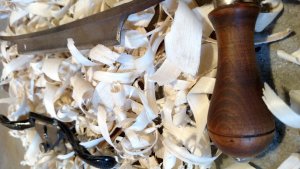
At it’s simplest “Active learning” is learning by doing. On our semesters, student’s make their own canoe paddles, and that’s their first big woodcarving project. They have a basic set of tools and simple instructions on how to shape a paddle from a pine board. A lot of student’s struggle at first with what [...]
Christopher Russell
Dec 15, 2017
Blog
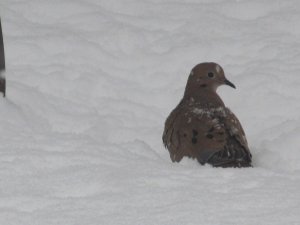
Well, everyone, it seems like winter’s finally here. The last three days I’ve woken up, made a quick thermos of coffee and thrown on my snowshoes for a morning hike. During those hikes, I was reminded of the stark differences in the ecosystem from season to season. We’ve talked before on the podcast about how [...]
Christopher Russell
Dec 9, 2017
Blog
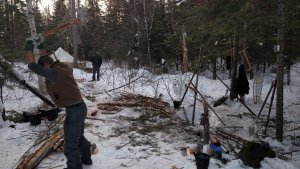
While I wrote up the course description for School Of The Forest’s Family Bushcraft Week, I couldn’t help but think of the families in the neighborhood I grew up in, and our yearly “backyard campout”. Once every summer, all the fathers, and their kids would pitch tents in the small common ground behind our homes [...]
Christopher Russell
Nov 27, 2017
Blog
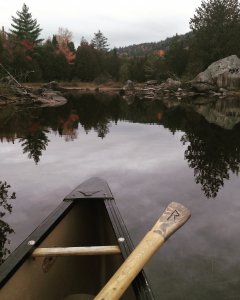
I think I can speak for everyone on the Jack Mountain team when I say we’re all passionate about the outdoors. That’s a broad statement and individually, each of us is drawn by different aspects of an outdoor lifestyle. Running School Of The Forest programs has let me see this same thing unfold with young [...]
Christopher Russell
Oct 20, 2017
Blog
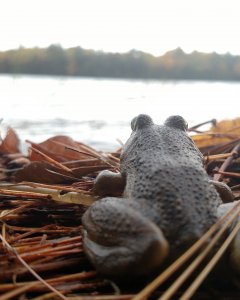
Nature studies are a vital part of our “first person ecology” curriculum at Jack Mountain and School Of The Forest, and after a conversation about methodology of study with my colleague Ben Spencer I wanted to write a bit about why its such a vital part of the curriculum. It’s easy to read a lot of facts [...]
Christopher Russell
Jun 6, 2017
Blog
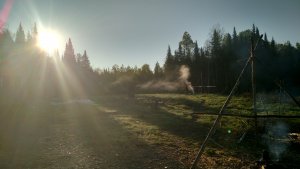
May-29-2016 Hey everyone. We’ve got about three weeks left in the course, so I sat down with Tim Smith again to chat about it so far, but mostly because he offered me coffee. There will be a podcast of our discussion in the future, but for now, I’d like to just compile my own thoughts [...]
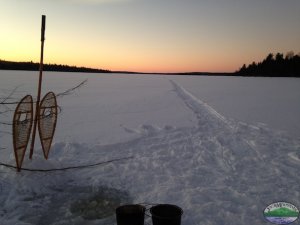
I laced up my skates for the first time in five years today and hit the ice with my youngest’s first grade class. It felt great to be at the rink and brought back a lot of powerful memories. Even if I never stepped into a hockey rink again, it will always be a big [...]
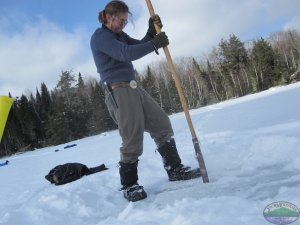
We’ve got two last-minute open spots for the Wilderness Bushcraft Semester starting April 20th and running through June 21st. After repeated unsuccessful attempts to contact a person who had registered for the upcoming semester, and someone dropping out of the course, I’ve opened those spots up. So although we’ve been full for several months, if [...]
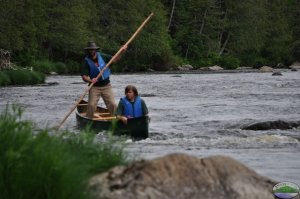
Yesterday I was part of a conversation led by a man who runs a small academic program for homeschoolers. He was talking about the modern fascination with being able to measure learning when he mentioned that problem solving is not as important as problem finding. This got me thinking. Modern education puts a high value [...]
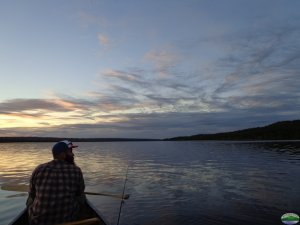
Our 2014 calendar is live on our site. We’ve added a few new folk school programs including the School Of The Forest, a monthly kids program, and the New Hampshire self reliance workshop series, a monthly adult program for which we’ve partnered with a local non-profit. We’ve also taken our weeklong winter bushcraft and survival [...]
Tim Smith
Apr 30, 2013
Blog
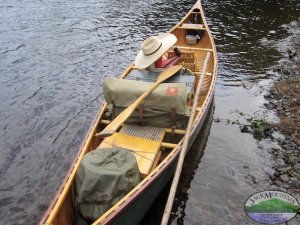
Last weekend was arguably the best weather you could request for the last weekend in April. Sunny, a slight breeze and warm, it was perfect for hitting the water and getting the winter cobwebs out of canoe muscles. We ran two, 1-day canoe programs at the folk school in NH and they both were fantastic. [...]
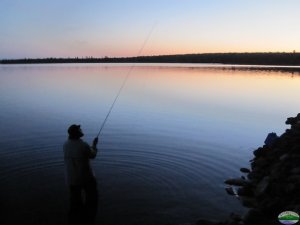
People put a lot of pressure on themselves to succeed, or to be really good at something right at the beginning. I, and anyone who has taught anything for any length of time, can tell you that learning doesn’t work that way. You don’t start out being good at something. It takes, blood, sweat and [...]
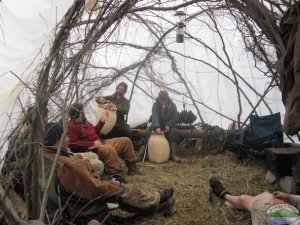
Over the past few months I’ve seen numerous blogs offering tips and tricks on bushcraft and survival. But tips and tricks will never take the place of practiced fundamentals; learning the correct technique, then doing it until it is second nature. The seemingly inexhaustible human desire for shortcuts keeps the search alive, but don’t be [...]
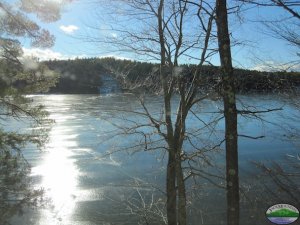
We’re back in Wolfeboro, New Hampshire. After three winters in Texas, my family and I have returned to the Lakes Region of NH. We’ll continue to run our full slate of field school programs in northern Maine. But I’m planning some new programs for New Hampshire and am excited about all the opportunities they’ll bring. [...]
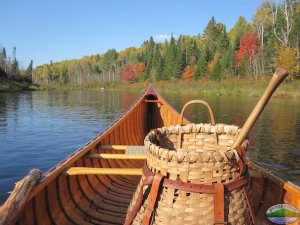
This past weekend we wrapped up our 21st long-term immersion program. When we started in August I had big plans about blogging every day, but the realities of field school life intervened and I only posted twice during the course. There were lots of great moments, from the weasel who lived under my tent and [...]
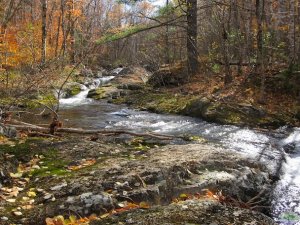
I woke up before dawn and watched the sun rise over Squapan ridge this morning. We’ve had a bunch of hot and humid weather, but a cold front came through yesterday afternoon and the overnight temperature was in the low 40’s. This morning the sky is clear and there a hint of autumn in the [...]
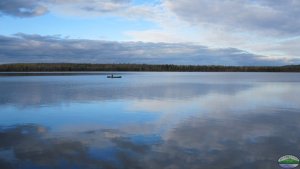
Yesterday we started our 21st bushcraft semester course, our 11th since relocating our immersion programs to the field school in Masardis, Maine. It’s significant because now we’ve run more of them here than at our old base in New Hampshire. It’s also the first semester course where we’ve been able to accept the GI Bill [...]
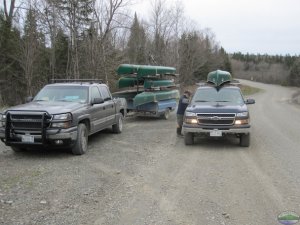
There’s a legendary story about the band Van Halen and their tour rider with concert venues from the 1970’s and 80’s that has to do with brown M&M’s (the candy). Buried deep within the contract was a clause that they demanded to have M&M’s backstage, but that someone had to go through and pick out [...]
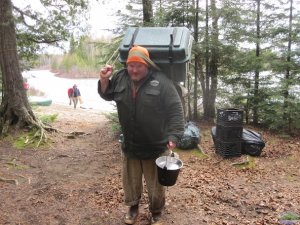
Following up on yesterday’s post, I’m currently reading a book called Discussion Based Online Teaching To Enhance Student Learning by Tisha Bender. This year we’re adding a distance learning component to our immersion programs, and I’m educating myself as to how to do it effectively. More on this later. Bender relays a story on page 38 [...]
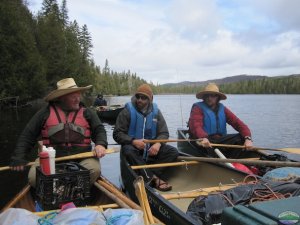
I first met Mors Kochanski in 1995 at his place in Alberta. Over the years we’ve stayed in touch and I’ve learned much from his sage advice. Recently at Woodsmoke we were chatting when someone complained about being kept up late the night before. Mors responded with several great lines I’ll never forget. I’m paraphrasing, [...]
“Never seem more learned than the people you are with. Wear your learning like a pocket watch and keep it hidden. Do not pull it out to count the hours, but give the time when you are asked.” – Lord Chesterfield No one likes a know-it-all. Most people don’t even like a know-it-some. Is there [...]
There is a specific type of person who always has to have the last word. If you’ve done something, they claim to have done it bigger and better. And if they haven’t, they have a friend who has. When I was in college my friends and I knew a guy for whom this was his [...]
These two quotations from “The Art Of Outdoor Living” jumped out at me because what they say about experiential education and a realistic assessment of skill through a practical exam apply directly to our new Journeyman Bushcraft Instructor & Wilderness Guide Certification Program. Scroll to the bottom for full bibliographic information. “The training and preparation [...]
One of the new aspects we’re building into our Journeyman Certification Course are skill and craft benchmarks. It’s great to learn how to make new things. But, to attain even a basic skill level with them, they have to be completed a number of times. For example, on some of our courses students learn how [...]
It takes time to learn. For some things, this can be measured in minutes. For others, it’s measured in decades. When we become enamoured with something, we often want to shorten the learning time so we can get to the point where we’re respected for knowing it, where we’re the celebrated “expert”. So the temptation [...]
A lot of what we do in our bushcraft courses doesn’t look like formal education. The old-school image of a standing instructor lecturing to seated students taking notes is a rarity. We have no love affair with seat time, nor with the lecture format. You’re more likely to see a small group of people engaged [...]
We stopped using sandpaper for smoothing wood on field courses years ago. Sandpaper is sand, or grit, glued to a piece of paper in a thin layer. It doesn’t last very long, which precludes it from being taken on long trips. A simple alternative is to take a piece of fabric (denim or cotton duct [...]
A question discussed on many outdoor forums is what gear a person needs. My question is what can a person do without?
You learn to write by writing. It’s a truism, but what makes it a truism is that it’s true. The only way to learn to write is to force yourself to produce a certain number of words on a regular basis. – William Zinsser, from “On Writing”, p.49. Is there anything you could switch writing [...]
When you’re learning a new skill, it should be as simple as possible, broken down into its necessary elements and with as many details as possible stripped away. The focus should be on the minimum input needed for success. This is why many how-to books aimed at beginners fail; too much detail. On our bushcraft [...]
Taking a course does not make you an expert. You become an expert by investing enough time, energy and sweat to really learn something in depth. How much time? Malcom Gladwell, in his book Outliers, popularized the 10,000 hour rule; “The idea that it takes approximately 10,000 hours of deliberate practice to master a skill.” [...]
I have learned more about fungi from Paul Stamets‘s book Mycelium Running (Amazon.com link) than any other resource. While other books on mushrooms are often great field guides for identifying individual species, Stamets’s book has helped me to understand the ecology and relationships of mushrooms. I still have a long way to go, but I [...]
“Craft teaches our dependence upon the natural material world directly and practically – not as an abstraction.” – Zabe MacEachern, from her article Crafting as a practice of Relating to the Natural World in the Canadian Journal of Environmental Education (CJEE), Vol 5, No 1 – 2000. Crafting is often seen as a way to [...]
My experience running 16 bushcraft and wilderness semester courses has taught me the value of taking a time-out from modern life and living more simply. I’ve seen the positive effect the experience has had on course participants. I know the effects it has had on me. Some of these include: Separating needs from wants. Living [...]
Can you train people for white water canoeing without them spending time in white water? Is training without a realistic setting viable? I spent six years trying to get people ready for white water canoe poling and paddling by having them complete exercises on smooth water. But when we got to the actual white water, [...]
Bushcraft is about doing something. Not about buying something. This is good to keep in mind in our era of gear saturation.
I’ve been researching the role of crafting on the learning process recently. There is a mountain of how-to information on crafting, but most of it on how-to-do things; the questions of why and what are the impacts are aren’t as common. Since crafting is one of the seven core elements of the Jack Mountain Bushcraft [...]
It takes a minimum of 100 miles to learn how to paddle a canoe It takes a minimum of 80 miles to learn how to pole a canoe It takes a minimum of 100 friction fires to learn how to consistently make a friction fire It takes a minimum of 50 percussion fires to learn [...]
Assessment exists for the student, not for the instructor. At their worst, assessment systems put students in a competition with their peers. At their best, they provide a way for students to gauge their progress and to see how far they’ve come, give them an honest accounting of where their skills fit into the bigger [...]
Teaching bushcraft these days is as much about helping people to eliminate the extraneous as it is showing them something new. Put another way, it’s as much carving as it is building. Much of what passes for common knowledge in bushcraft and outdoor living is fantasy, created and fed by poorly conceived books, movies and [...]
“Toddlers ask many questions, and so do school children – until about grade three. By that time many of them have learned an unfortunate fact, that in school, it can be more important for self-protection to hide one’s ignorance about a subject than to learn more about it, regardless of one’s curiosity.” – Jan Hunt [...]
Read a great post by Jeff Butler of Northwoods Survival on their Facebook page. What is interesting and what is essential? This is a very important questions especially for people who spend a lot of time in the bush. At NWS we look at it this way: The ability to make fire by friction = [...]
Our job as a school is not to make you a bushcraft or survival expert. It’s to teach you all the things you need to know, and to provide you with the necessary experience you need as building blocks in order to become an expert. Actually doing it takes blood, sweat and tears on your [...]
We’ve had some great discussions about how the brain works in the learning process as part of our ongoing online course on becoming an instructor. One aspect that we’ve only touched on briefly is the role of exercise in the learning process. To simplify a complex subject into a soundbite, exercise is good for your [...]
Nutshimit is a word and concept from the Innu. Previously known by the name given to them by the French, Montagnais, they inhabit a huge, sparsely populated region of Quebec and Labrador. For many Innu, life in the village is marked by idleness and a sense of loss and alienation, in strong contrast to being [...]
The question of how our bushcraft courses are applicable in the modern world comes up from time to time both in email and through discussions, so I wanted to formally address it today. When examined from a sufficient distance so as to blur the specific skills, our courses teach four things: problem solving, leadership, self-reliance [...]
I’ve been thinking for several years about putting together an expedition-style course for young men where we’d spend three or four weeks in the north woods canoeing and living outdoors. It would be a similar, although less rigorous, curriculum that we use in our college semester programs, with a focus on academic subjects such as [...]
TV survival shows are about hardships and risk. With background music to set the mood, the feeling of jeopardy hangs heavily over the host as s/he negotiates within an inch of his/her life. The danger makes it sexy. In the real world, bushcraft is much more about heritage and tradition rather than risk. The old [...]
Thinking about taking a semester off from college and spending it in the wilderness? If so, compare the different approaches of our program versus the large, corporate wilderness education companies. If you’re looking for modern, high-tech outdoor education with programs on backpacking and mountaineering, then check them out. But if you’re interested in building a [...]
Is it better to know a little about hundreds of outdoor skills, or to know a lot about a few core skills? This is a heated debate, and the answer often depends on how you live your life. For the urban set, where bushcraft is a trivial pursuit, breadth wins you more kudos at skills [...]
As part of the online course we’re running titled “Becoming A Bushcraft Instructor”, we’re currently reading the book “Hare Brain, Tortoise Mind” by Guy Claxton. We’ve been enjoying many thoughtful discussions on teaching and learning and how they apply to bushcraft and the outdoors. This gem of a passage is from near the end of [...]
I was discussing bushcraft on Saturday and trying to explain it to someone whose life experience has been all in urban areas. In discussing life at our field school, I explained that it was just like life anywhere else, except without the infrastructure. I thought about this for a while after the conversation ended, and [...]
Our first online course, titled “Becoming A Bushcraft Instructor,”, has been a great experience thus far. We’ve had some thoughtful discussions about our first book, Hare Brain Tortoise Mind, which examines how the brain processes information. I’ve been learning a lot from the discussion. As a sample, below is a post from Russ Venditto on [...]
Simple food, simple shelter, simple transportation, simple tools, simple gear. A simple, rich, rewarding life.
I’ve never looked the part. Most people never do. We’re TBH (trained by hollywood) that people who do certain things should look a certain way. After all, that’s how they look in the movies. But it’s a big lie. My high school soccer coach was adamant about people not using their appearance to stand out. [...]
Our educational system has become increasingly abstract over the last hundred years. Instead of instruction in sensory development and hands-on skills, we focus almost exclusively on the intellectual and the abstract. Much of this is the result of the influence of Jean Piaget and his stage theory of cognitive development from the 1920’s. He viewed [...]
For poor instructors, it’s all about the instructor. For marginal instructors, it’s all about the material. For good instructors, it’s all about the student.
Knowledge comes from using information, not access to it. It’s an important distinction to be made in the era of the web and the unlimited amount of information available. Just because someone copies a bit of how-to information onto an online forum doesn’t mean they know something. I’m not trying to be elitist, but there [...]
There’s a difference between outdoor leadership and management. Management is when you ensure people carry out predetermined tasks leading to a defined outcome. Managers aren’t looking for innovation. They’re there to ensure things get done according to a preexisting plan. When we’re cooking a group dinner over a campfire in a remote location, we often [...]
We’ve been fielding a lot of questions about our yearlong program lately. Several people over the weekend wanted to know if students live on-site for the entire year. The answer is no, they don’t. The program is organized around three intensives: the fall semester, the winter program, and the spring expedition. For graduates, there is [...]
I was recently interviewed by Iain Haywood at ooh.com. You can read the piece here. In addition to some nice photos of Ernie Davis and David Bosum, I’m quoted on educational philosophy: “At its best, teaching should be invisible; a person who learns from a mediocre instructor will realize how talented their instructor is. The [...]
Our semester course originally grew out of the desire to move past a skills-only paradigm to include the experience of living a simple outdoor life. After ten years and 12 semester courses, I think we’ve been successful at introducing a new idea of outdoor education to the world that isn’t limited to just hard or [...]
I had the opportunity to do some reading and enjoy some spirited discussions on our recent trip to northern Quebec. One of the topics that kept coming up was the lack of decent terminology in english for the simple, outdoor lifestyle based on skill, simple tools and a relationship with the land and it’s resources. [...]
Arctic explorer Vilhjalmur Stefansson wrote that “adventure is a sign of incompetence.” But if it isn’t for adventure, why do people do the things they do? I’m with Stefansson on adventure. It implies that you’re not prepared for what you face, which, in the case of living a life outdoors, should never be the case. [...]
The number of primitive skills and survival schools has swelled in the last few years, and while all schools are not created equal there are many opportunities to learn wilderness skills these days. It’s important to be clear about what we do because it’s different than what’s available elsewhere. Yes, we teach skills. We’re among [...]
We went out on a family tracking walk yesterday. The snow was perfect and there were all sorts of tracks for my son to investigate. It’s fun being outside with him and seeing the landscape through his eyes. One of the neat things we can learn from children is the idea of vu-ja-de. It’s the [...]
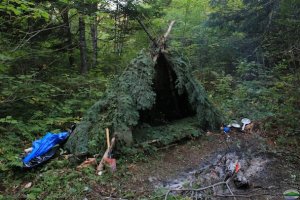
There’s a lot of information about bushcraft on the web, but much of it is focused around equipment and celebrities, not knowledge and experience. If you’re just getting started, here are seven things to keep in mind. 1. It’s not about the gear. We did alright for 99% of human history without all the latest [...]
I saw an ad for a college today and in the photo they had as their centerpiece was a student in a lecture hall looking toward the front and acting interested. That’s a negative for me. I remember sitting through a bunch of lectures, some great, some not, but what I took away from the [...]
I’ve taken a wide variety of wilderness medical courses around the northeast. In 2000, I took a winter medicine and rescue course at the AMC center in Pinkham Notch at the base of Mount Washington. It was a two-day course, and on many nights they have slide show presentations for the people staying there. The [...]
Last summer I guided a trip to northern Quebec where we spent a week with Cree guides David Bosum and Lawrence Capissit. They were born in the bush and have spent their lives living off of the country there. One day one of guys on the trip was asking David some questions about winter trips. [...]
“Having done is worth more than having read, having watched, or knowing how.” I was thinking about experiential learning yesterday when the line above came to me. I think it will be our slogan for 2008. We live in the era where information is everywhere. But we should never confuse familiarity with understanding or experience. [...]
Our first day of the spring bushcraft semester course was marked by a wide range of weather. We went from still air, to snowy whiteout, to sleet, to rain, as the temperature warmed through the day. In the afternoon we went into the bush to familiarize everyone with the area. On our way out, we [...]
When I was a kid I remember being at a small airfield with my dad. As we walked past the planes, he explained to me how they were built. We stopped in front of one plane and he told me that this one didn’t come from a factory; It had been built by the owner. [...]
I had a professor in graduate school who said that we decide how the world works by the time we’re two and a half years old, and we spend the rest of our lives justifying and defending that idea. It’s a concept that keeps coming up and makes me think about what I believe and [...]
I spend a lot of time thinking about the teaching process in preparation for our courses. Years of doing so have led me to believe that there are many things that can be learned, but not directly taught. An example of this took place the other night when some of the participants in our winter [...]
Open To Outcome; A Practical Guide For Facilitating And Teaching Experiential Reflection offers some simple, practical tools that are relevant to outdoor education. A brief survey of everyone you know will most likely reveal that among the top five moments of learning in their lives, at least four did not take place in the classroom. [...]
I’ve got a book from 1972 called The Walk Of The Conscious Ants, by Taylor Morris, that tells the true story of a college professor and his students who decided that instead of taking a semester of regular courses, they would walk from their school in southwestern New Hampshire to Nova Scotia. It’s an interesting [...]
Teaching is a process. My son is learning how to skate, and it’s challenging for me as his teacher. I have no memory of learning how to skate as I learned at age 3, the same age he’s at now. For me to teach him, I can’t rely on personal experience because I’ve known how [...]
I’ve thought a lot about what it takes to become proficient at bushcraft and a competent guide. Obviously, it takes a lot of hands-on instruction and a lot of time spent in the bush doing it. But it also takes a lot of rigorous study. The natural world is not something that can be learned [...]
It’s several weeks after the end of our fall semester program, and all the written work for the college credit option is in. I’ll be posting some of it here, starting with Russ Venditto’s final paper. It’s a .pdf file, and you can get it by clicking here. I’ve added a section to our Bushcraft [...]
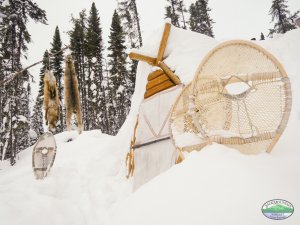
A guy called me yesterday with questions about our Summer Survival Weekend Course. We spoke for several minutes about what the course covers, what he could expect, and other related topics. Then said he had a question about religion. He asked if we incorporated spiritual teachings or Native American ceremonies in the course. I immediately [...]
Teaching is tiring. Learning is even more so. Teaching can be practiced until it becomes an art. After years of doing it you occasionally get thrown by a student’s question, but for the most part you get better the more you do it (this refers to teaching, not content knowledge). Learning is the act of [...]
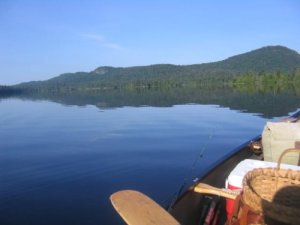
Last week I went on a solo canoe/fishing trip to Allagash Lake and Allagash stream. I put in on Allagash Stream above the lake, where it’s narrow and winding. There wasn’t a lot of water so I poled the entire way to the deadwater above the lake. As I was coming around a corner I [...]
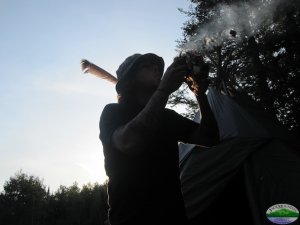
Becoming competent at lighting fires with a hand drill or bow drill takes time, sweat and blisters. But it can be done. There’s a difference between trying to get a coal and trying to master the techniques. Decide what your goals are before you proceed. If you want to get a coal, then drill until [...]
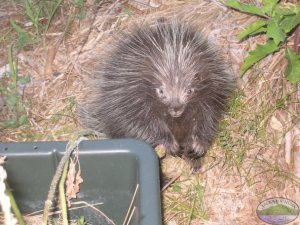
If you work as a guide or teach wilderness survival for any length of time, someone, or more often lots of people, are going to ask your opinion of those individuals who have elevated themselves to celebrity status in this type of work. I duck these questions and avoid these types of conversations, if only [...]









































